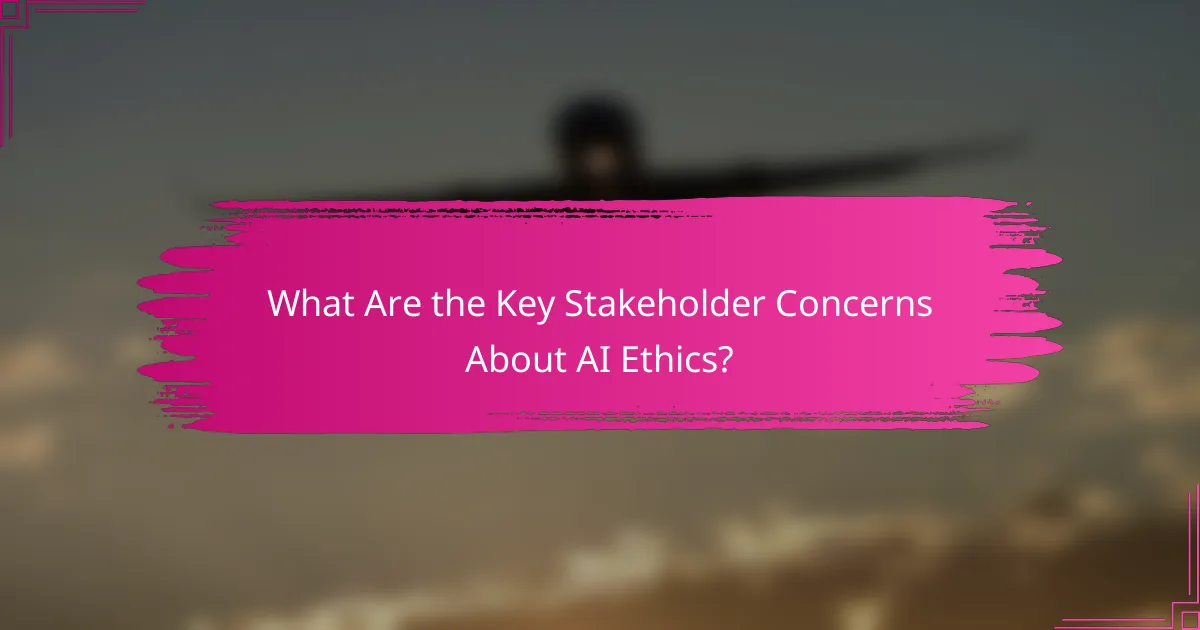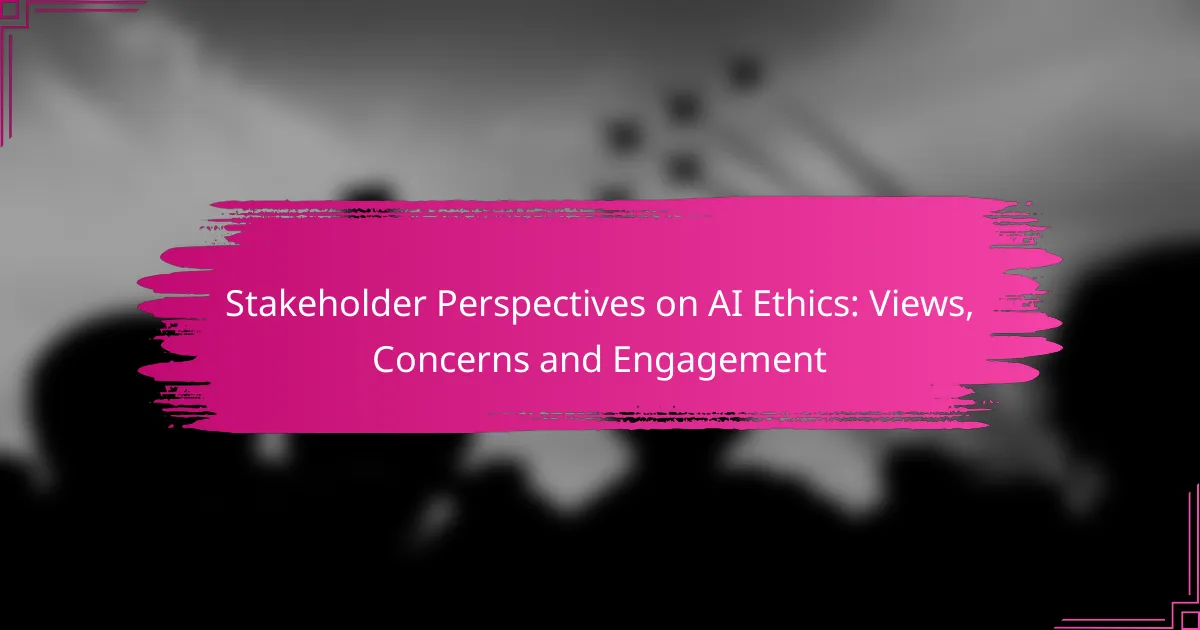As artificial intelligence continues to shape various aspects of society, stakeholder perspectives on AI ethics have become increasingly vital. Concerns regarding privacy, fairness, and accountability highlight the need for responsible AI development that fosters public trust. Different stakeholders, including corporations, governments, and the public, engage with these ethical issues through tailored strategies that reflect their unique roles. By adopting best practices focused on transparency and inclusivity, organizations can effectively address the ethical implications of AI technologies.

You can learn more in Stakeholder Perspectives on AI Ethics.
What Are the Key Stakeholder Concerns About AI Ethics?
Key stakeholder concerns about AI ethics revolve around the implications of AI technologies on society, particularly regarding privacy, fairness, accountability, job security, and regulatory compliance. Addressing these concerns is crucial for fostering trust and ensuring responsible AI development and deployment.
Privacy and Data Security
Privacy and data security are paramount concerns for stakeholders when it comes to AI ethics. The collection and processing of vast amounts of personal data can lead to unauthorized access and misuse, raising significant ethical questions. Organizations must implement robust data protection measures to safeguard sensitive information.
To enhance privacy, stakeholders can adopt practices such as data anonymization and encryption. Regular audits and compliance with regulations like the General Data Protection Regulation (GDPR) in Europe can also help mitigate risks associated with data breaches.
Bias and Fairness
Bias and fairness in AI systems pose serious ethical challenges, as algorithms can inadvertently perpetuate existing societal biases. This can result in unfair treatment of individuals based on race, gender, or socioeconomic status. Stakeholders must prioritize fairness in AI design to ensure equitable outcomes.
To combat bias, organizations should regularly evaluate their AI models for discriminatory patterns and incorporate diverse datasets during training. Engaging with affected communities can provide valuable insights into potential biases and help create more inclusive AI solutions.
Accountability and Transparency
Accountability and transparency are critical for building trust in AI systems. Stakeholders are concerned about who is responsible for decisions made by AI, especially in high-stakes scenarios like healthcare or criminal justice. Clear accountability frameworks are essential to address these concerns.
Organizations can enhance transparency by documenting AI decision-making processes and providing explanations for outcomes. Implementing explainable AI techniques can help stakeholders understand how decisions are made, fostering greater trust in the technology.
Job Displacement
Job displacement due to AI automation is a significant concern for many stakeholders. While AI can increase efficiency, it may also lead to job losses in certain sectors, raising ethical questions about the future of work. Stakeholders must consider the social implications of AI deployment.
To address job displacement, organizations should invest in reskilling and upskilling programs for affected workers. Collaborating with educational institutions can help prepare the workforce for new roles created by AI advancements.
Regulatory Compliance
Regulatory compliance is a key concern for stakeholders in the AI landscape. As governments worldwide introduce regulations governing AI use, organizations must ensure their technologies align with legal requirements. Non-compliance can result in significant penalties and reputational damage.
Staying informed about evolving regulations, such as the AI Act in the European Union, is crucial for organizations. Establishing compliance teams and conducting regular assessments can help ensure adherence to legal standards while fostering ethical AI practices.

How Do Different Stakeholders Engage with AI Ethics?
Different stakeholders engage with AI ethics through tailored strategies that reflect their unique roles and responsibilities. Corporations, governments, and the public each have distinct approaches to addressing ethical concerns related to artificial intelligence.
Corporate Engagement Strategies
Corporations often focus on developing internal guidelines and frameworks to ensure ethical AI deployment. This includes establishing ethics boards, conducting impact assessments, and adhering to industry standards. Companies may also engage with stakeholders through transparency initiatives and public reporting on their AI practices.
For instance, tech firms might implement regular audits of their AI systems to identify biases or unintended consequences. Engaging with external experts and communities can enhance corporate accountability and foster trust.
Government Policy Development
Governments play a crucial role in shaping AI ethics through legislation and regulatory frameworks. They often collaborate with industry leaders and academic institutions to create policies that promote responsible AI use while safeguarding public interests. This includes drafting regulations that address data privacy, algorithmic transparency, and accountability.
In the European Union, for example, the proposed AI Act aims to regulate high-risk AI applications, ensuring they meet strict ethical standards. Policymakers must balance innovation with ethical considerations to foster a safe AI environment.
Public Awareness Campaigns
Public awareness campaigns are essential for educating citizens about the ethical implications of AI technologies. These initiatives often focus on informing the public about potential risks, benefits, and the importance of ethical considerations in AI development. Engaging the public can help shape societal norms and expectations around AI use.
Campaigns may include workshops, online resources, and community discussions aimed at demystifying AI technologies. By fostering dialogue, stakeholders can better understand public concerns and expectations, leading to more responsible AI practices.

What Are the Best Practices for Ethical AI Implementation?
Best practices for ethical AI implementation focus on ensuring fairness, accountability, and transparency throughout the AI lifecycle. Organizations should adopt a structured approach that incorporates inclusive design, regular audits, and active stakeholder collaboration.
You can explore more about these principles in ethical AI development considerations.
Inclusive Design Principles
Inclusive design principles aim to create AI systems that consider diverse user needs and perspectives. This involves engaging with various demographic groups during the design phase to ensure that the technology is accessible and beneficial to all, including marginalized communities.
For instance, when developing a facial recognition system, it is crucial to include diverse datasets that represent different ethnicities, genders, and age groups. This helps to mitigate biases that could lead to unfair treatment of certain populations.
Regular Ethical Audits
Conducting regular ethical audits is essential for maintaining the integrity of AI systems. These audits should assess compliance with ethical guidelines, identify potential biases, and evaluate the impact of AI decisions on users and society.
Organizations can implement a schedule for audits, such as quarterly or biannual reviews, to ensure ongoing accountability. Utilizing established frameworks like the IEEE’s Ethically Aligned Design can provide a structured approach to these evaluations.
Stakeholder Collaboration
Engaging stakeholders throughout the AI development process fosters transparency and trust. This collaboration should include not only technical experts but also end-users, ethicists, and community representatives who can provide valuable insights into potential ethical concerns.
For effective collaboration, organizations can create advisory boards or focus groups that meet regularly to discuss ethical implications and gather feedback. This approach helps to align AI initiatives with societal values and expectations, ultimately leading to more responsible AI deployment.

How Do Cultural Perspectives Shape AI Ethics?
Cultural perspectives significantly influence the development and implementation of AI ethics by shaping values, priorities, and concerns related to technology. Different societies may prioritize privacy, fairness, or accountability differently, leading to diverse ethical frameworks that guide AI deployment.
Regional Variations in Ethical Standards
Ethical standards for AI vary widely across regions due to cultural, historical, and social factors. For instance, Western countries often emphasize individual rights and privacy, while some Asian cultures may prioritize collective well-being and social harmony. This divergence can affect how AI systems are designed and regulated.
In Europe, the General Data Protection Regulation (GDPR) sets strict guidelines for data protection and privacy, reflecting a strong cultural emphasis on individual rights. In contrast, countries in the Middle East may focus more on the implications of AI for social order and governance, leading to different ethical considerations.
Influence of Local Regulations
Local regulations play a crucial role in shaping AI ethics by establishing legal frameworks that dictate acceptable practices. Countries with robust regulatory environments, such as the European Union, often have comprehensive laws that address issues like data protection and algorithmic accountability.
In the United States, regulations can vary significantly by state, leading to a patchwork of ethical standards. For example, California has implemented its own privacy laws, which may differ from those in other states, affecting how AI companies operate and engage with users.

What Frameworks Exist for Evaluating AI Ethics?
Several frameworks exist for evaluating AI ethics, focusing on principles such as fairness, accountability, and transparency. These frameworks guide organizations in assessing the ethical implications of AI technologies and ensuring responsible deployment.
IEEE Global Initiative on Ethics of Autonomous and Intelligent Systems
The IEEE Global Initiative provides a comprehensive framework aimed at ensuring that autonomous and intelligent systems are designed and implemented ethically. It emphasizes the importance of human rights, privacy, and the well-being of individuals and communities.
This initiative outlines key principles, including transparency, accountability, and the need for stakeholder engagement. Organizations are encouraged to adopt these principles to foster trust and mitigate risks associated with AI technologies.
EU AI Act Guidelines
The EU AI Act establishes a regulatory framework for AI systems within the European Union, focusing on risk-based categorization. It classifies AI applications into four risk levels: minimal, limited, high, and unacceptable, with corresponding obligations for each category.
For high-risk AI systems, organizations must conduct rigorous assessments, ensure compliance with transparency requirements, and implement robust monitoring mechanisms. This regulatory approach aims to protect fundamental rights while promoting innovation in AI technologies across EU member states.
